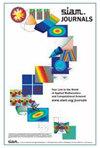基于非线性偏微分方程的高斯过程的参数推理
IF 1.9
3区 工程技术
Q2 MATHEMATICS, INTERDISCIPLINARY APPLICATIONS
引用次数: 0
摘要
SIAM/ASA 不确定性量化期刊》,第 12 卷第 3 期,第 964-1004 页,2024 年 9 月。 摘要:偏微分方程(PDE)被广泛用于描述物理和工程现象。偏微分方程中涉及的一些关键参数代表了某些具有重要科学解释的物理特性,但这些参数很难甚至不可能直接测量。从相关物理量的噪声和稀疏实验数据中估计这些参数是一项重要任务。许多用于 PDE 参数推断的方法都需要通过有限元法等算法对 PDE 的数值解进行大量评估,这可能会耗费大量时间,尤其是对于非线性 PDE。在本文中,我们提出了一种推断 PDE 未知参数的新方法,即基于 PDE-informed Gaussian process (PIGP) 的参数推断方法。通过将 PDE 解建模为高斯过程 (GP),我们推导出(线性)PDE 结构引起的流形约束,从而在约束条件下,GP 满足 PDE。对于非线性 PDE,我们提出了一种增强方法,将非线性 PDE 转换为在所有导数中均为线性的等效 PDE 系统,我们基于 PIGP 的方法可以处理该系统。我们提出的方法可应用于各种非线性 PDE。基于 PIGP 的方法可应用于多维 PDE 系统和具有未观测成分的 PDE 系统。与传统的贝叶斯方法一样,该方法可以为未知参数和 PDE 解提供不确定性量化。基于 PIGP 的方法还完全绕过了 PDE 的数值求解器。本文通过几个不同领域的应用实例对所提出的方法进行了演示。本文章由计算机程序翻译,如有差异,请以英文原文为准。
Parameter Inference Based on Gaussian Processes Informed by Nonlinear Partial Differential Equations
SIAM/ASA Journal on Uncertainty Quantification, Volume 12, Issue 3, Page 964-1004, September 2024.
Abstract.Partial differential equations (PDEs) are widely used for the description of physical and engineering phenomena. Some key parameters involved in PDEs, which represent certain physical properties with important scientific interpretations, are difficult or even impossible to measure directly. Estimating these parameters from noisy and sparse experimental data of related physical quantities is an important task. Many methods for PDE parameter inference involve a large number of evaluations for numerical solutions to PDEs through algorithms such as the finite element method, which can be time consuming, especially for nonlinear PDEs. In this paper, we propose a novel method for the inference of unknown parameters in PDEs, called the PDE-informed Gaussian process (PIGP)–based parameter inference method. Through modeling the PDE solution as a Gaussian process (GP), we derive the manifold constraints induced by the (linear) PDE structure such that, under the constraints, the GP satisfies the PDE. For nonlinear PDEs, we propose an augmentation method that transforms the nonlinear PDE into an equivalent PDE system linear in all derivatives, which our PIGP-based method can handle. The proposed method can be applied to a broad spectrum of nonlinear PDEs. The PIGP-based method can be applied to multidimensional PDE systems and PDE systems with unobserved components. Like conventional Bayesian approaches, the method can provide uncertainty quantification for both the unknown parameters and the PDE solution. The PIGP-based method also completely bypasses the numerical solver for PDEs. The proposed method is demonstrated through several application examples from different areas.
Abstract.Partial differential equations (PDEs) are widely used for the description of physical and engineering phenomena. Some key parameters involved in PDEs, which represent certain physical properties with important scientific interpretations, are difficult or even impossible to measure directly. Estimating these parameters from noisy and sparse experimental data of related physical quantities is an important task. Many methods for PDE parameter inference involve a large number of evaluations for numerical solutions to PDEs through algorithms such as the finite element method, which can be time consuming, especially for nonlinear PDEs. In this paper, we propose a novel method for the inference of unknown parameters in PDEs, called the PDE-informed Gaussian process (PIGP)–based parameter inference method. Through modeling the PDE solution as a Gaussian process (GP), we derive the manifold constraints induced by the (linear) PDE structure such that, under the constraints, the GP satisfies the PDE. For nonlinear PDEs, we propose an augmentation method that transforms the nonlinear PDE into an equivalent PDE system linear in all derivatives, which our PIGP-based method can handle. The proposed method can be applied to a broad spectrum of nonlinear PDEs. The PIGP-based method can be applied to multidimensional PDE systems and PDE systems with unobserved components. Like conventional Bayesian approaches, the method can provide uncertainty quantification for both the unknown parameters and the PDE solution. The PIGP-based method also completely bypasses the numerical solver for PDEs. The proposed method is demonstrated through several application examples from different areas.
求助全文
通过发布文献求助,成功后即可免费获取论文全文。
去求助
来源期刊

Siam-Asa Journal on Uncertainty Quantification
Mathematics-Statistics and Probability
CiteScore
3.70
自引率
0.00%
发文量
51
期刊介绍:
SIAM/ASA Journal on Uncertainty Quantification (JUQ) publishes research articles presenting significant mathematical, statistical, algorithmic, and application advances in uncertainty quantification, defined as the interface of complex modeling of processes and data, especially characterizations of the uncertainties inherent in the use of such models. The journal also focuses on related fields such as sensitivity analysis, model validation, model calibration, data assimilation, and code verification. The journal also solicits papers describing new ideas that could lead to significant progress in methodology for uncertainty quantification as well as review articles on particular aspects. The journal is dedicated to nurturing synergistic interactions between the mathematical, statistical, computational, and applications communities involved in uncertainty quantification and related areas. JUQ is jointly offered by SIAM and the American Statistical Association.
 求助内容:
求助内容: 应助结果提醒方式:
应助结果提醒方式:


